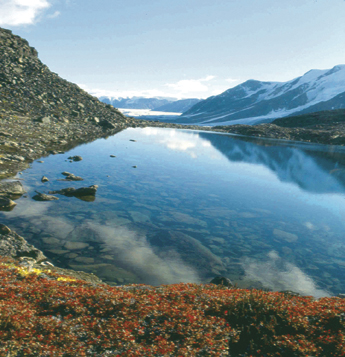Arctic algae show climate change
Sediment from Arctic lakes shows that much of the Northern Hemisphere has been warming for many decades.
By Emily Sohn
Tiny creatures in remote lakes are adding to the evidence for global warming. Most scientists agree that the climate is heating up. Studies of environments all over the world show that the warming has wide-ranging effects.
 |
|
In remote Arctic lakes, the population changes among certain species of microscopic algae chronicle variations in climate over the past 150 years.
|
| John P. Smol |
A recent study focused on changes at high altitudes way up north from Canada to Russia. Many of the lakes were on islands in the Arctic Ocean. They were too far away from civilization for people’s activities to directly influence them.
These lakes freeze over in the winter. That makes the plants and animals that live in them very sensitive to changes in climate. If temperatures warm up even just a few degrees, algae have a longer growing season and so do the animals that eat the plant material.
To learn more about how aquatic life has changed over the years in these remote places, scientists from Queen’s University in Kingston, Ontario, took 55 samples of sediment from the bottoms of dozens of lakes.
Within the samples, they counted remains of tiny creatures including water fleas, insect larvae, and algae called diatoms. The team recorded the numbers of these lake inhabitants at different depths. The deeper the sediment, the older it is.
 |
|
Counting the remains of tiny creatures, such as this diatom, can reveal what the climate was like years ago.
|
| Kathleen Rühland |
Results showed that ecosystems started to change in many of the lakes about 150 years ago. Populations of water fleas and algae-eating insect larvae increased, for example. And one type of diatom replaced another.
The researchers speculate that the shift was a result of climate change. Warming kept lakes unfrozen for a longer period each year, they say. Some species thrive in those conditions. Others do worse.
The new study didn’t look at what is causing global warming in the first place. Instead, it illustrates that minor shifts in temperature can have major effects on life around the globe.
Going Deeper:
Perkins, Sid. 2005. Warm spell: Arctic algae record shift in climate. Science News 167(March 5):148. Available at http://www.sciencenews.org/articles/20050305/fob3.asp .







